|
|
|
Sort Order |
|
|
|
Items / Page
|
|
|
|
|
|
|
| Srl | Item |
| 1 |
ID:
069088
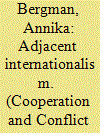

|
|
|
| 2 |
ID:
027514
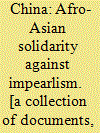

|
|
|
|
|
| Publication |
Peking, forign language press, 1964.
|
| Description |
viii, 440p.
|
|
|
|
|
|
|
|
|
|
|
|
Copies: C:1/I:0,R:0,Q:0
Circulation
| Accession# | | | | | | | | | | | |
| 002598 | 327.17165/CHI 002598 | Main | On Shelf | General | | | | | | | |
|
|
|
|
| 3 |
ID:
144684
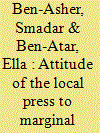

|
|
|
|
|
| Summary/Abstract |
This article examines the 2001‒2003 coverage by the local press in the Haifa region of the struggle of the fishermen who claimed to have contracted cancer as a result of coming into contact with the polluted water of the Kishon River. It shows that the local press chose to deliver to its readers an ‘interpretive package’ that portrays the fishermen as ‘The River’s Heroes’, a group fighting for justice and morality for the benefit of all. However, alongside the favourable framing were also some of the writers’ stereotypical elitist perceptions, at times explicit and at others implicit, of the fishermen. In the case of the Kishon fishermen, whereas the local press played an important role in covering their struggle, it only partially presented the solidarity dimension wherein the differences between people and groups constitutes the basis for moral relations between them.
|
|
|
|
|
|
|
|
|
|
|
|
|
|
|
|
| 4 |
ID:
149284
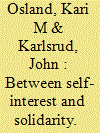

|
|
|
|
|
| Summary/Abstract |
Norway has been a firm supporter of, and contributor to, UN peacekeeping operations. However, while increasing its financial support since the end of the Cold War, Norway has significantly downscaled its troop contributions to the UN, focusing on NATO operations. Rather than interpreting this as lessened interest in the UN, we point out that support and commitment cannot be measured solely in numbers of troops deployed. Norway’s commitment to UN peacekeeping should be understood as part of its strategic culture, here read as a synthesis between self-interest and solidarity, and between the UN and NATO. This article details the institutional, political and material challenges and opportunities for renewed engagement in UN peacekeeping.
|
|
|
|
|
|
|
|
|
|
|
|
|
|
|
|
| 5 |
ID:
159906
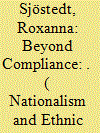

|
|
|
|
|
| Summary/Abstract |
Implementation of minority rights norms is an important step for integration. The ultimate aim of norm diffusion is internalization, that is, when a norm is being taken for granted. This article seeks to develop an understanding of socialization beyond formal compliance and suggests that material and ideational structures at both the elite and societal levels mutually reinforce one another. The framework is applied to the case of the integration of the Russian minority in Estonia, 1991–2016. The concepts of recognition and solidarity help to theorize and explain this socialization process and the constraints of both materialist and identity dimensions.
|
|
|
|
|
|
|
|
|
|
|
|
|
|
|
|
| 6 |
ID:
169414
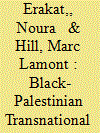

|
|
|
|
|
| Summary/Abstract |
This introductory essay outlines the context for this special issue of the Journal of Palestine Studies on Black-Palestinian transnational solidarity (BPTS). Through the analytic of “renewal,” the authors point to the recent increase in individual and collective energies directed toward developing effective, reciprocal, and transformative political relationships within various African-descendant and Palestinian communities around the world. Drawing from the extant BPTS literature, this essay examines the prominent intellectual currents in the field and points to new methodologies and analytics that are required to move the field forward. With this essay, the authors aim not only to contextualize the field and to frame this special issue, but also to chart new directions for future intellectual and political work.
|
|
|
|
|
|
|
|
|
|
|
|
|
|
|
|
| 7 |
ID:
104106
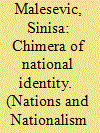

|
|
|
|
|
| Publication |
2011.
|
| Summary/Abstract |
In both popular discourse and many academic works, the existence of national identity is largely taken as given. Although researchers disagree on whether national identities are modern or perennial, and how best to gauge the intensity of identification with a particular nation, there is near unanimity on the view that national identities are real and perceptible entities. In contrast to this view I argue not only that there was no national identity before modernity but also that there is little empirical evidence for the existence of national identities in the modern age either. While it is obvious that many individuals show great affinity for their nations and often express sincere devotion to the 'national cause', none of these are reliable indicators of the existence of a durable, continuous, stable and monolithic entity called 'national identity'. To fully understand the character of popular mobilisation in modernity it is paramount to refocus our attention from the slippery and non-analytical idiom of 'identity' towards well-established sociological concepts such as 'ideology' and 'solidarity'. In particular, the central object of this research becomes the processes through which large-scale social organisations successfully transform earnest micro-solidarity into an all-encompassing nationalist ideology.
|
|
|
|
|
|
|
|
|
|
|
|
|
|
|
|
| 8 |
ID:
076800
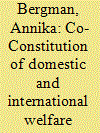

|
|
|
|
|
| Publication |
2007.
|
| Summary/Abstract |
Sweden's self-narrative is that of an outward-looking internationalist state whose commitments to justice and equality are not confined to co-nationals. What distinguishes Swedish internationalism, apart from being social democratically inspired, is that it rests on a thin conception of cosmopolitan duty that does not exclusively privilege the rights of Swedish nationals alone, but recognizes the need to extend social and political rights to non-nationals as well. Key here is the universality principle of the Nordic welfare model, which inspires policies that do not tend to discriminate on the basis of class or ethnic background. What is more, this way of thinking has not generally been confined to the domestic level, but can be traced through to Sweden's (and the other Nordic states') distinctive foreign policy traditions. This article examines the inter-connection between domestic and international welfare commitments in the Swedish context. The key thesis developed here is that states that promote the values of solidarity, inclusiveness and universal welfare at the national level are also more likely to do so beyond borders. The article deconstructs the endogenously framed ideational factors that underpin Swedish internationalism, with particular focus on social democracy in the process. It also investigates the co-constitutive relationship between Sweden's domestic and international welfare commitments by exploring contemporary discourses and practices that make up a significant part of Sweden's self-identity. Finally, it analyses the normative relevance of a social democratically inspired Swedish internationalism for the future of Nordic internationalism more generally.
|
|
|
|
|
|
|
|
|
|
|
|
|
|
|
|
| 9 |
ID:
188239
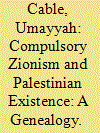

|
|
|
|
|
| Summary/Abstract |
This essay offers a genealogy of the phrase “compulsory Zionism” in order to illuminate its vexed and contradictory intellectual foundations, the ethical and political stakes of the discourse surrounding the phrase, and its accompanying racial project. Scholars of late have taken up the use of this phrase to signal how “common-sense” knowledge about Palestine and Israel is naturalized in ways that privilege Israel and subjugate Palestinian existence. However, I argue that the phrase is also useful for understanding how Palestine solidarity politics are micromanaged within transnational leftist social justice movements and academia.
|
|
|
|
|
|
|
|
|
|
|
|
|
|
|
|
| 10 |
ID:
180208


|
|
|
|
|
| Summary/Abstract |
Contemporary liberal and democratic states have ‘securitized’ a growing number of issues by advancing the notion of societal security. This is coupled with a proactive stance and the conception of building societal resilience in order to withstand future crises and disturbances. The preemptive logic of contemporary security and crisis management calls for a new type of resilient neoliberal subject who is willing to accept uncertainty and shoulder greater individual responsibility for her own security. This article offers a genealogical analysis of this development in Sweden since the end of the Cold War, highlighting the role now assigned to citizens within social and national security planning. I argue that seeking a return to a more traditional notion of ‘total defence’ blurs the previously important war/peace and crisis/security distinctions. While war preparedness in previous eras was an exceptional aspect of human life and citizenship, the conceptions of security now evolving bind together societal and national security such that civil and war preparedness are merged into an ever-present dimension of everyday existence. The analysis also reveals that the responsibilization of individuals introduces a moral dimension into security and generates new forms of citizen–citizen relations. These extricate the sovereign powers of the state and the liberalist social contract between the state and its citizens.
|
|
|
|
|
|
|
|
|
|
|
|
|
|
|
|
| 11 |
ID:
172908
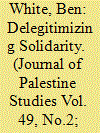

|
|
|
|
|
| Summary/Abstract |
In response to growing Palestine solidarity activism globally—and particularly in countries that have been traditional allies of Israel—the Israeli government has launched a well-resourced campaign to undermine such efforts. A key element of this campaign consists in equating Palestine advocacy; the Boycott, Divestment, Sanctions (BDS) movement; and anti-Zionism with anti-Semitism. The concerted effort to delegitimize solidarity with the Palestinians is taking place even as genuine anti-Semitism is on the rise, thanks to the resurgent white nationalism of the Far Right in Europe and North America—political forces that Israel is harnessing to help shield from scrutiny and accountability its apartheid policies toward Palestinians, both citizens of the state as well as those under military rule. In its efforts to conflate anti-Zionism with anti-Semitism, the Israeli government is assisted by non-state organizations that nonetheless enjoy close ties with the state and its agencies.
|
|
|
|
|
|
|
|
|
|
|
|
|
|
|
|
| 12 |
ID:
148619
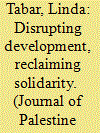

|
|
|
|
|
| Summary/Abstract |
Originally developed for the Center for Development Studies at Birzeit University in 2011, this paper examines the humanitarian assistance that flooded the occupied Palestinian territories after the beginning of the second intifada (2000–2005). It provides a critical analysis of the international development aid that was directed at Palestinians in the West Bank and Gaza Strip, where the Oslo process was territorialized, to the exclusion of the vast majority of the Palestinian people. Today, Palestinians are challenging the dominant development discourse and neoliberal economic model set in place by the Oslo Accords, wherein development recast Israeli settler colonialism as an externality, which the putative Palestinian state-building project would transcend. Returning to Yusif Sayigh's view that development cannot occur under settler colonialism, Palestinians are articulating alternatives to the Oslo post-conflict paradigm that emphasize self-reliance and resistance. The discussion that follows situates itself as a contribution to this process by interrogating the anti-political bias of humanitarianism and charting how indigenous Palestinians are building alternatives to food aid.
|
|
|
|
|
|
|
|
|
|
|
|
|
|
|
|
| 13 |
ID:
178792
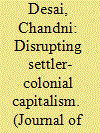

|
|
|
|
|
| Summary/Abstract |
This article explores the resurgence of Indigenous/Palestine solidarity during the Wet’suwet’en land sovereignty struggle in Canada that took place around the same time Donald Trump’s Middle East “peace plan” was released in early 2020. Historicizing this resurgence within a longer period of anti-colonial resistance, the article attends to the distinct historical, political-economic, and juridical formations that undergird settler colonialism in Canada and Israel/Palestine. It contends with the theoretical limits of the settler-colonial framework, pushing back against narratives of settler success, and shows how anti-colonial resistance accelerated economic crises that led both settler states to enter into “negotiations” with the colonized (reconciliation in one case, and peace talks in the other) as a strategy to maintain capitalist settler control over stolen lands. The analysis also sheds light on a praxis of solidarity that has implications for movement building and joint struggle.
|
|
|
|
|
|
|
|
|
|
|
|
|
|
|
|
| 14 |
ID:
153679
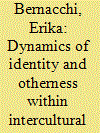

|
|
|
|
|
| Summary/Abstract |
Drawing on fieldwork carried out in 2012–2013, this article explores the dynamics of identity and otherness within selected women’s intercultural associations in Italy in the light of the following issue: how to acknowledge differences among women – based primarily on ‘race’, ethnicity, legal status/citizenship, class and age – while maintaining a common political project. This article focuses on the contexts, which facilitate the formation of such a project by promoting the contesting of rigid categorization of women on grounds of nationality or culture. It first focuses on what is referred to as ‘a starting point a bit displaced’, second on the desire to move beyond divisions on nationality grounds and third on the concept of hybridity as a bridge between women. At the same time, the article confronts those issues that might conceal power differentials among women and argues in favour of a notion of feminist intercultural reflexivity.
|
|
|
|
|
|
|
|
|
|
|
|
|
|
|
|
| 15 |
ID:
179171
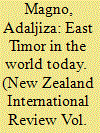

|
|
|
|
|
| Summary/Abstract |
Timor-Leste emerged as the youngest nation of the third millennium amidst a wave of sympathy and solidarity. It is always gratifying for us to know that the commitment for Timor-Leste is still on-going. So, once again, in the name of the Timorese people, I convey our great appreciation of New Zealand's genuine sympathy and solidarity.
|
|
|
|
|
|
|
|
|
|
|
|
|
|
|
|
| 16 |
ID:
191925
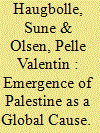

|
|
|
|
|
| Summary/Abstract |
In the late 1960s, Palestine became an iconic signifier of solidarity and support for the Left, but also a transgressive tool that shaped and re-situated ideological positions at domestic levels. In this article, we attempt to answer why, how, and when this happened. Most research to date has stressed the global diplomatic offensive by the PLO (Palestine Liberation Organization). Palestinian revolutionary thought and action are obviously the primary explanatory factors for the emergence of their cause internationally. However, a one-sided approach blurs the agency of the global revolutionaries and solidarity activists who helped elevate Palestine to a global cause. This article takes a comparative approach and uses Denmark and Norway as two illustrative examples of Palestine’s transformation into a global leftist cause. Denmark and Norway are central cases because solidarity movements in Scandinavia developed early on, and because they exemplify how Fatah, in Norway, and the Popular Front for the Liberation of Palestine (PFLP), in Denmark, advanced different models of solidarity and cultural diplomacy. We compare these two cases with new evidence from other countries in order to summarize how a cultural transfer of symbols, interpretations, experiences, and ideological positioning took place in the 1960s and 1970s through meetings, translations, and organizational links.
|
|
|
|
|
|
|
|
|
|
|
|
|
|
|
|
| 17 |
ID:
178179
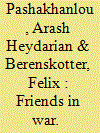

|
|
|
|
|
| Summary/Abstract |
This article scrutinizes the assumption that friends support each other in times of war. Picking up the notion that solidarity, or ‘other-help’, is a key feature of friendship between states, the article explores how states behave when a friend is attacked by an overwhelming enemy. It directs attention to the trade-off between solidarity and self-help that governments face in such a situation and makes the novel argument that the decision about whether and how to support the friend is significantly influenced by assessments of the distribution of material capabilities and the relationship the state has with the aggressor. This proposition is supported empirically in an examination of Sweden’s response to its Nordic friends’ need for help during the Second World War – to Finland during the 1939–1940 ‘Winter War’ with the Soviet Union, and to Norway following the invasion of Germany from 1940 to 1945.
|
|
|
|
|
|
|
|
|
|
|
|
|
|
|
|
| 18 |
ID:
073754
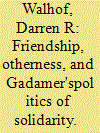

|
|
|
|
|
| Publication |
2006.
|
| Summary/Abstract |
This article makes the political dimension of Gadamer's thought more explicit by examining the interplay of three concepts in his work: solidarity, friendship, and the other. Focusing primarily on certain post-Truth and Method writings, I argue that Gadamer's conception of solidarity has to do with historically contingent manifestations of bonds that reflect a civic life together of reciprocal co-perception. These bonds go beyond conscious recognition of observable similarities and differences and emerge from encounters among those who are, and remain, in important ways other to each other. I make this case through an analysis of Gadamer's phenomenology of friendship and the crucial role of otherness in his accounts of both understanding and friendship. I suggest that Gadamer's political thought gives us a way of conceptualizing solidarity and otherness without making the other same or leaving the other completely other.
|
|
|
|
|
|
|
|
|
|
|
|
|
|
|
|
| 19 |
ID:
074616
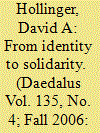

|
|
|
| 20 |
ID:
119496
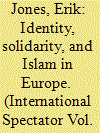

|
|
|
|
|
| Publication |
2013.
|
| Summary/Abstract |
Populists argue that Islamic immigrants are fundamentally different from Europeans. As evidence, they point to notions of religious and cultural identity. Such arguments have popular resonance. As more mainstream politicians pick up on these themes, they begin to take on an air of common sense. Nevertheless, they are mistaken. Europe has a long track record of reconciling competing identities. This has happened by focusing on patterns of interaction (solidarity) rather than obvious indicators of distinctiveness. Using the examples of the Netherlands and Turkey, this article illustrates the wide spectrum of European approaches to the challenge of getting different groups to share the same geographic space.
|
|
|
|
|
|
|
|
|
|
|
|
|
|
|
|
|
|
|
|
|